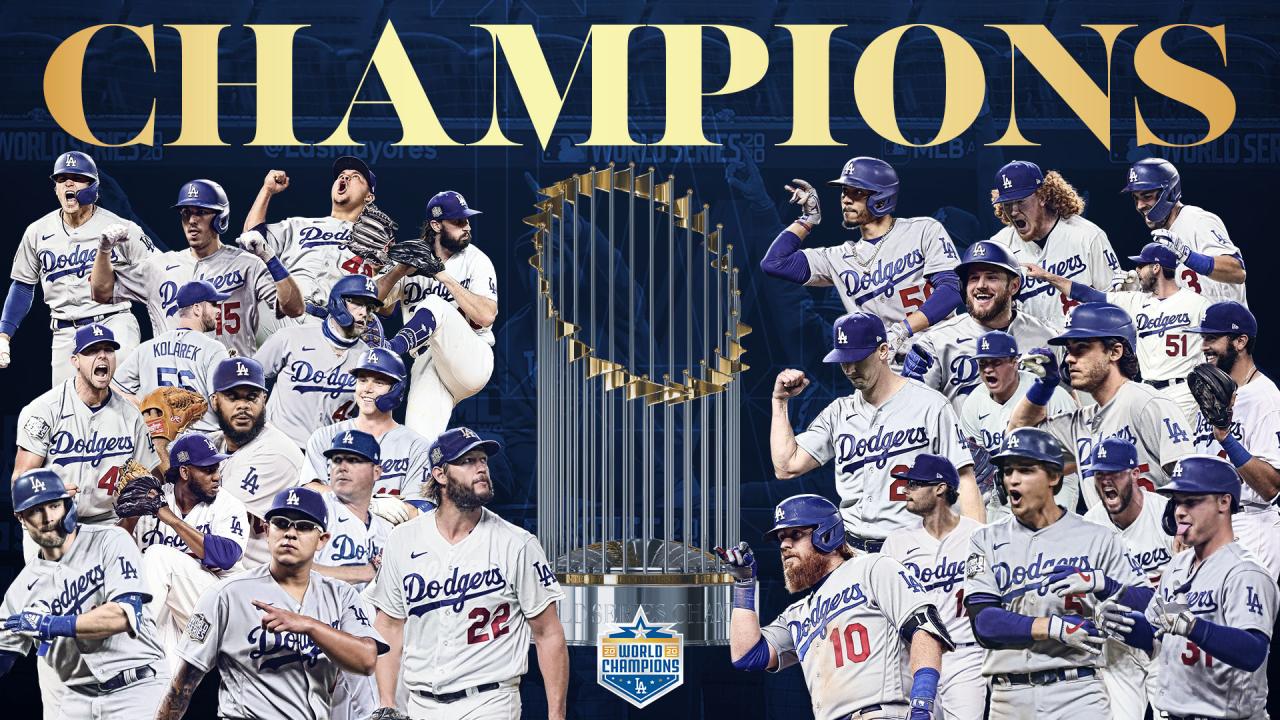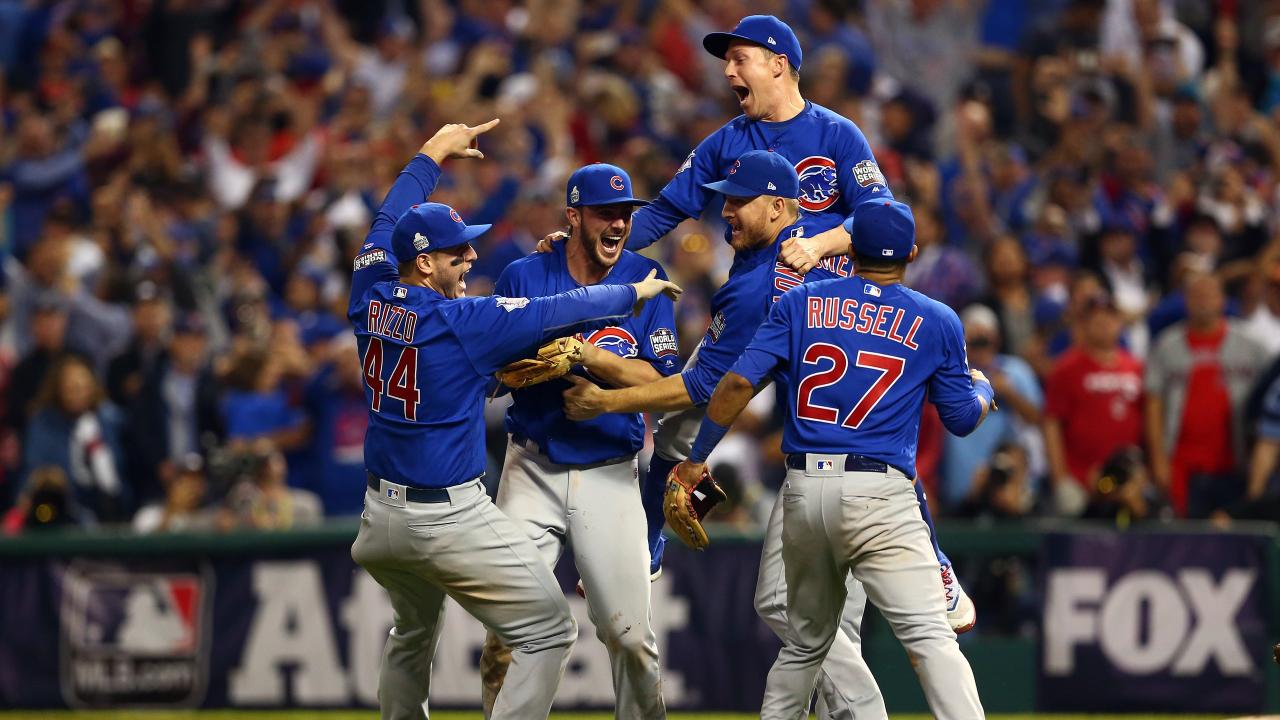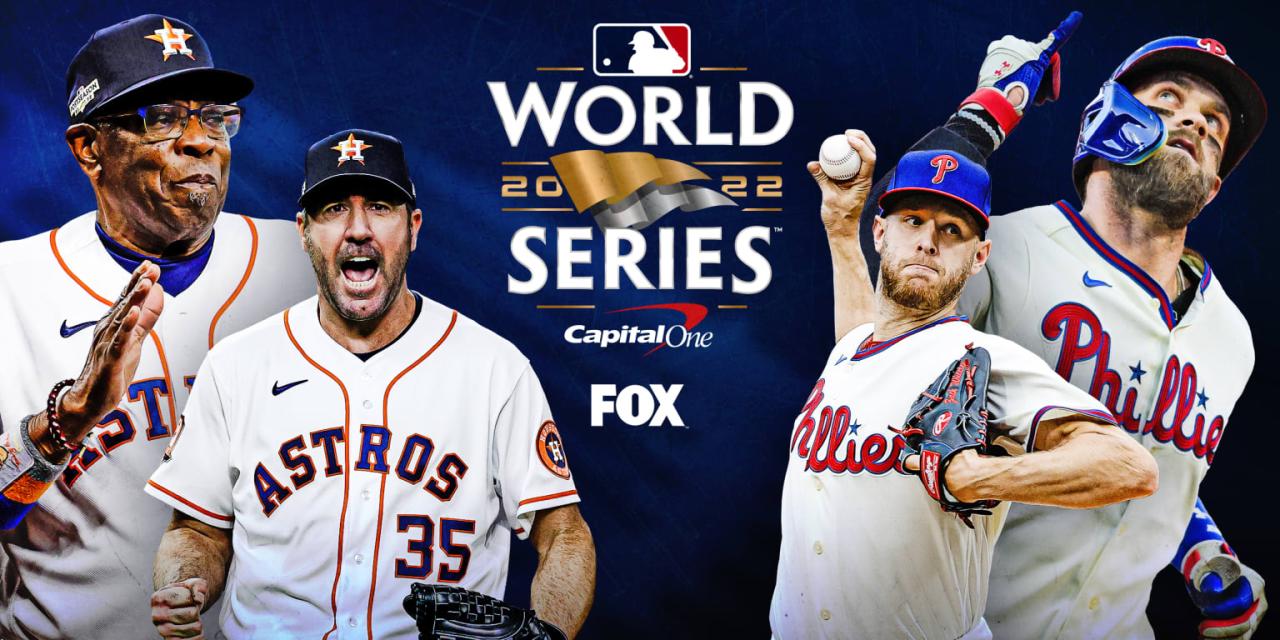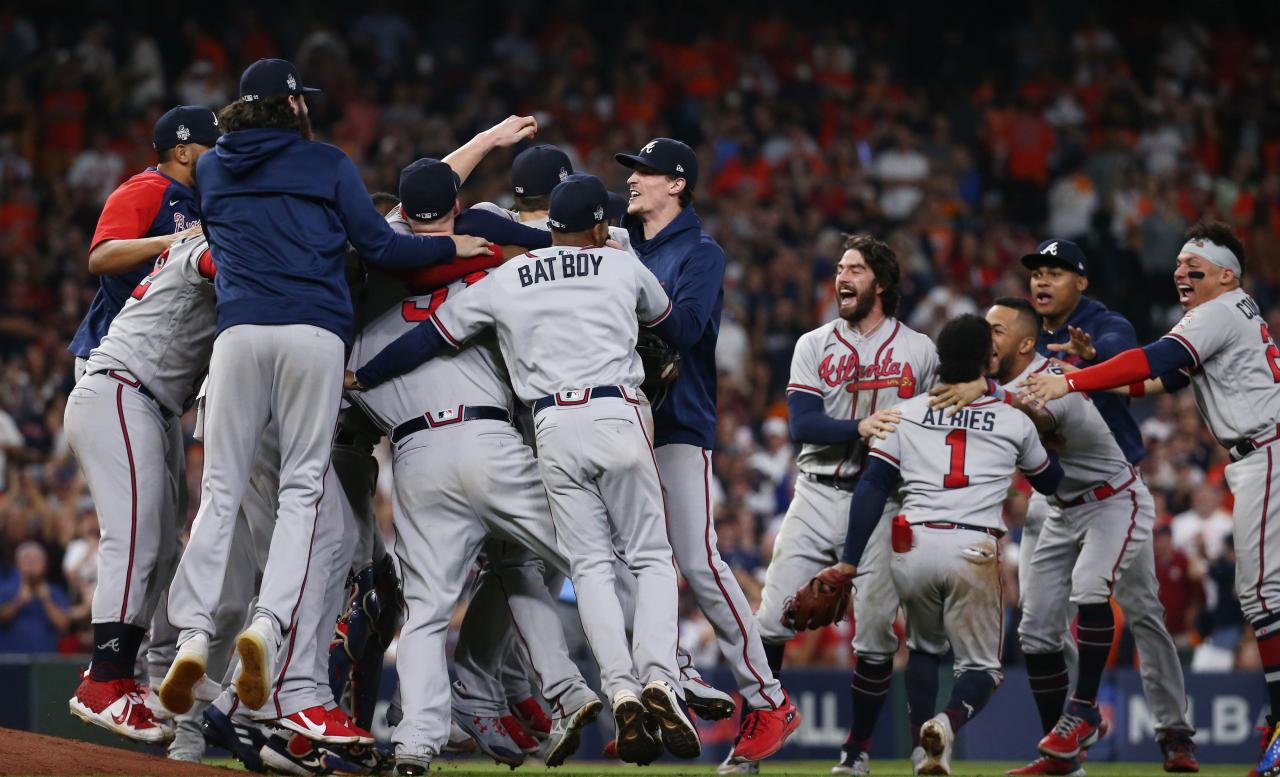The World Series, a hallowed tradition in baseball, embodies the pinnacle of athletic achievement and competitive spirit. From its humble beginnings to its present-day grandeur, the World Series has captivated generations of fans, weaving a tapestry of unforgettable moments and legendary players. This annual clash of titans, where the best of the best battle for supremacy, is more than just a sporting event; it’s a cultural phenomenon that resonates deeply with the American spirit.
This exploration delves into the rich history of the World Series, tracing its evolution from its inaugural season to its modern-day spectacle. We’ll uncover the captivating stories and iconic moments that have shaped its legacy, and examine the profound impact it has had on the game of baseball and its devoted fans.
Format and Rules of the World Series
The World Series is the championship series of Major League Baseball (MLB), determining the annual champion of the sport. It is a best-of-seven series played between the winners of the American League (AL) and the National League (NL) pennants. The World Series is a highly anticipated event, attracting millions of viewers and generating significant media attention.
Structure of the World Series Playoffs
The World Series is the culmination of a lengthy playoff process that begins after the regular season. The structure of the playoffs has evolved over time, but the general format remains consistent. The playoffs are divided into three rounds:
- Division Series: The top two teams in each division of the AL and NL advance to the Division Series, where they face each other in a best-of-five series. The winners of each division series advance to the League Championship Series.
- League Championship Series: The two division series winners from each league face off in a best-of-seven series to determine the league champion. The AL champion and NL champion then advance to the World Series.
- World Series: The AL champion and NL champion play a best-of-seven series to determine the World Series champion. The team that wins four games first is declared the champion.
Rules and Regulations of the World Series
The World Series is governed by the rules of Major League Baseball, with a few specific regulations for the championship series:
- Designated Hitter (DH) Rule: The DH rule is in effect for the World Series, meaning that the AL team can use a designated hitter in the series. This rule is not in effect for the NL, so the NL team must use a pitcher in the DH spot.
- Tie-breaker Games: If a game in the World Series is tied after nine innings, the game will continue until a winner is determined. There is no limit to the number of extra innings that can be played.
- Home-field Advantage: The team with the better regular season record in its league has home-field advantage in the World Series. This means that the team with the better record will host Games 1, 2, 6, and 7 of the series, while the other team will host Games 3, 4, and 5.
Significance of Winning the World Series
Winning the World Series is the ultimate achievement in Major League Baseball. It signifies a team’s dominance and represents the pinnacle of success for players, coaches, and fans.
- Historical Recognition: Winning the World Series guarantees a team’s place in baseball history. The team’s name is etched into the Commissioner’s Trophy, and its players receive World Series rings. The team’s victory is also commemorated in various media and publications, ensuring that its accomplishment is remembered for years to come.
- Financial Rewards: Winning the World Series brings significant financial rewards for the team and its players. The team receives a substantial share of the World Series revenue, and players earn World Series bonuses. These financial rewards can be substantial, particularly for players who have performed well during the playoffs.
- Personal Accolades: Winning the World Series is a personal achievement for players, coaches, and team personnel. It provides a sense of accomplishment and validates their hard work and dedication. Players who win the World Series are often recognized as some of the best in the game, and their names are associated with baseball history.
Impact of the World Series on Baseball
The World Series, the pinnacle of Major League Baseball, has had a profound impact on the sport’s popularity, strategy, and overall culture. From its inception, the World Series has served as a catalyst for growth and evolution, shaping baseball into the global phenomenon it is today.
Impact on Baseball Popularity
The World Series has been a major driver of baseball’s popularity. The annual event attracts millions of viewers worldwide, generating significant media attention and public interest.
- Increased Viewership: The World Series consistently ranks among the most-watched sporting events in the United States, drawing in a diverse audience. The event’s popularity has also translated into a surge in interest for regular season games, leading to higher attendance figures and increased revenue for teams.
- Global Reach: The World Series has helped to expand baseball’s global reach. With the advent of international broadcasts and streaming services, the event is now accessible to fans in countries around the world. This increased exposure has led to a growing international fan base for baseball, particularly in countries like Japan, South Korea, and the Dominican Republic.
- Cultural Significance: The World Series has become a cultural touchstone in the United States. The event has been featured in countless movies, TV shows, and songs, cementing its place in American popular culture. The World Series also provides a platform for players to become national icons, with players like Babe Ruth, Jackie Robinson, and Derek Jeter achieving legendary status through their World Series performances.
Impact on Baseball Strategy and Tactics
The World Series has also influenced the evolution of baseball strategy and tactics. The high-stakes nature of the event has encouraged teams to adopt innovative approaches to maximize their chances of winning.
- Emphasis on Pitching: The World Series has traditionally been a pitching-dominated event, with teams relying on their ace pitchers to deliver key victories. This emphasis on pitching has led to a greater focus on developing and acquiring top pitching talent, shaping the way teams build their rosters.
- Defensive Specialization: The World Series has also highlighted the importance of defensive specialization. Teams have increasingly sought out players with exceptional defensive skills, particularly at positions like shortstop and center field, where they can make crucial plays in high-pressure situations.
- Strategic Flexibility: The World Series has forced teams to be more flexible in their approach to the game. With the pressure to win every game, teams have had to adapt their strategies based on the strengths and weaknesses of their opponents, utilizing a variety of offensive and defensive tactics to gain an edge.
Economic and Social Impact of the World Series
The World Series has a significant economic and social impact on the host cities and the communities involved.
- Economic Boost: The World Series brings a significant economic boost to the host city, generating revenue from ticket sales, hotel stays, and tourism. The event also attracts media attention and sponsorships, creating a ripple effect throughout the local economy.
- Community Pride: The World Series serves as a source of community pride, uniting fans around a common goal. The event provides an opportunity for fans to celebrate their team’s achievements and to showcase their city’s spirit.
- Social Impact: The World Series has also had a social impact, particularly in the realm of race relations. The 1947 World Series, featuring Jackie Robinson and the Brooklyn Dodgers, marked a pivotal moment in the fight for racial equality in baseball and American society. The event helped to break down barriers and pave the way for greater diversity in the sport.
Notable World Series Moments
The World Series is a spectacle of athletic prowess, but it’s also a tapestry woven with unforgettable moments that transcend the game itself. These moments, etched in baseball history, encapsulate the drama, the joy, and the sheer brilliance that make the World Series such a cherished event.
Iconic Performances
Iconic performances have become synonymous with the World Series. These feats of athleticism, often defying expectations, have cemented their place in the annals of baseball history.
- Babe Ruth’s “Called Shot” (1932): During Game 3 of the 1932 World Series, Babe Ruth, facing the Chicago Cubs’ Charlie Root, pointed to the center field bleachers before launching a home run. This legendary moment, captured in photographs, became a symbol of Ruth’s dominance and the audacity of a baseball icon.
- Kirk Gibson’s Walk-Off Home Run (1988): Game 1 of the 1988 World Series saw the Oakland Athletics leading the Los Angeles Dodgers. With two outs in the bottom of the ninth inning, Kirk Gibson, battling injuries, entered as a pinch hitter and launched a game-winning home run off Dennis Eckersley. This improbable feat, with Gibson’s limp and dramatic swing, remains one of the most celebrated moments in World Series history.
- Jackie Robinson’s World Series Debut (1947): Jackie Robinson’s historic integration of Major League Baseball in 1947 was a pivotal moment in American history. In 1947, he played in the World Series with the Brooklyn Dodgers, becoming the first African American player to compete in the Fall Classic. His performance, while not a championship, represented a monumental step towards equality in baseball.
Unforgettable Games
The World Series is a stage for extraordinary games, often featuring thrilling comebacks, dramatic finishes, and unforgettable performances. These games have become benchmarks for the sport, showcasing the unpredictable nature of baseball.
- Game 6 of the 1986 World Series (Boston Red Sox vs. New York Mets): This game, known for its “Mookie Wilson Ground Ball” and the “Buckner Error,” remains a legendary chapter in baseball history. The Mets, trailing 3-2 in the series, rallied for a 6-5 victory in the 10th inning. The Mets’ dramatic comeback, fueled by errors and timely hitting, made it one of the most memorable games in World Series history.
- Game 7 of the 1975 World Series (Cincinnati Reds vs. Boston Red Sox): This game, played in a downpour at Fenway Park, is remembered for the “Carlton Fisk Home Run.” With the Reds leading 6-3 in the 12th inning, Fisk hit a towering home run, reaching up to “will” it into the stands. The dramatic win secured the World Series title for the Reds, creating a legendary moment in baseball lore.
- Game 7 of the 2016 World Series (Cleveland Indians vs. Chicago Cubs): This game, ending a 108-year championship drought for the Cubs, is considered one of the most thrilling World Series games in recent history. The Cubs, trailing 3-1 in the series, won three consecutive games to secure their first World Series title since 1908. The dramatic win, with a series of clutch hits and impressive pitching performances, created a moment of pure elation for Cubs fans and baseball enthusiasts alike.
Top 10 Most Exciting World Series Moments
| Rank | Moment | Year | Series | Teams |
|—|—|—|—|—|
| 1 | Kirk Gibson’s Walk-Off Home Run | 1988 | World Series | Los Angeles Dodgers vs. Oakland Athletics |
| 2 | Babe Ruth’s “Called Shot” | 1932 | World Series | New York Yankees vs. Chicago Cubs |
| 3 | Carlton Fisk’s Game 7 Home Run | 1975 | World Series | Cincinnati Reds vs. Boston Red Sox |
| 4 | Mookie Wilson’s Ground Ball and Buckner Error | 1986 | World Series | New York Mets vs. Boston Red Sox |
| 5 | Jackie Robinson’s World Series Debut | 1947 | World Series | Brooklyn Dodgers vs. New York Yankees |
| 6 | Game 7 of the 2016 World Series | 2016 | World Series | Chicago Cubs vs. Cleveland Indians |
| 7 | Joe Carter’s Walk-Off Home Run | 1993 | World Series | Toronto Blue Jays vs. Philadelphia Phillies |
| 8 | Willie Mays’ “The Catch” | 1954 | World Series | New York Giants vs. Cleveland Indians |
| 9 | Bill Mazeroski’s Game 7 Walk-Off Home Run | 1960 | World Series | Pittsburgh Pirates vs. New York Yankees |
| 10 | “The Curse of the Bambino” | 1918 | World Series | Boston Red Sox vs. Chicago Cubs |
Last Word
The World Series stands as a testament to the enduring power of baseball, its ability to inspire, unite, and entertain. As the future unfolds, the World Series will undoubtedly continue to evolve, embracing new technologies and innovative strategies while preserving the core values that have made it a beloved institution. Whether it’s the thrill of a game-winning home run or the suspense of a nail-biting pitching duel, the World Series promises to deliver unforgettable experiences for generations to come.
FAQ Compilation
How many teams participate in the World Series?
Two teams, the champions of the American League and the National League, compete in the World Series.
What is the format of the World Series?
The World Series is a best-of-seven series, meaning the first team to win four games is crowned the champion.
How long has the World Series been played?
The first World Series was held in 1903.
What is the significance of winning the World Series?
Winning the World Series is the ultimate goal for any Major League Baseball team, signifying the highest level of achievement in the sport.
Who are some of the most legendary World Series players?
Some of the most legendary World Series players include Babe Ruth, Jackie Robinson, Willie Mays, and Hank Aaron.
The World Series is a thrilling spectacle that brings together fans from across the globe. Whether you’re a die-hard supporter or just enjoying the excitement, finding a comfortable and convenient place to stay is essential. If you’re looking for a special and luxurious option, consider a bridal suite hotel near me for a memorable experience.
After all, a winning team deserves a winning stay, and the World Series is all about celebrating the pinnacle of baseball achievement.
The World Series is a thrilling event that brings baseball fans together from all over. If you’re planning a trip to see a game, you might need to consider accommodations, especially if you’re traveling with a group. For a comfortable and convenient stay, consider looking for hotels with conference rooms near me , which can provide a space for your group to gather and discuss the game.
Whether you’re cheering for your favorite team or just enjoying the atmosphere, a good hotel can make your World Series experience even more enjoyable.
The World Series is a time of intense excitement and anticipation for baseball fans worldwide. This year, the series saw a stellar performance from Juan Soto , whose exceptional batting prowess and strategic plays added another layer of intrigue to the competition.
As the series concluded, fans were left reflecting on the remarkable talent displayed and the enduring legacy of this iconic sporting event.





3 thoughts on “World Series: A Baseball Legacy”